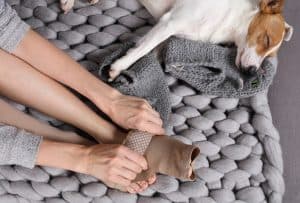What Should I Expect After Sclerotherapy?

Sclerotherapy is performed in the office without the use of general anesthesia. There is essentially no down time associated with the procedure. You will be able to drive yourself to and from the appointment and should be able to return to your day-to-day activities right away.
Compression Garments after Sclerotherapy
After sclerotherapy, you will be advised to wear compression garments (socks or stockings) for the first 24 hours. You should wear them at all times, only removing them to shower. After the first 24 hours, you can remove them at night while sleeping. This will usually last for three (3) to five (5) weeks.
To manage your pain, you can use acetaminophen-based medicine like Tylenol. Stay away from anti-inflammatory drugs such as aspirin and ibuprofen. They can affect your blood’s ability to clot.

Keep your legs covered and avoid sunlight. If you must be in the sun, use sunscreen. This will help protect you from discoloration in the treated area. Stay away from overly hot areas such as saunas and steam rooms and standing water like hot baths, hot tubs and the beach. These limitations will be lifted after a few days.
Staying active is an important step to reduce the risk of blood clots but don’t over do it right away. Avoid strenuous aerobic exercises for the first few days. Instead of running or lifting weights you might try walking. If you had a lot of veins treated, you might want to avoid any airplane travel for several days as well.
Is Sclerotherapy Permanent?
According to a research it has been found that sclerotherapy is successful in 80-90% of cases.
Which means if the treatment was successful then the venous problems won’t come back.
But it doesn’t mean newer veins will not appear and you may need to get treatment for it.
If your veins doesn’t appear after the first session then you may need more sclerotherapy sessions.
Lastly, its possible that these venous diseases may appear again if they are happing because of genetic reasons, if your parents suffered from varicose veins or spider veins then you will have to face them multiple times.
Alternatives of sclerotherapy?
There are alternatives available for those who may not be suitable candidates for Sclerotherapy or prefer alternative treatment options. Here are a few alternatives to Sclerotherapy:
- Laser Therapy: Laser therapy involves the use of intense beams of light to target and destroy the affected veins. It is a non-invasive procedure that can be effective in treating both small spider veins and larger varicose veins. Laser therapy is relatively painless and requires minimal downtime.
- Radiofrequency Ablation: This procedure uses radiofrequency energy to heat and close off the affected veins. A thin catheter is inserted into the vein, and the heat generated by the radiofrequency energy causes the vein walls to collapse and seal shut. Radiofrequency ablation is a minimally invasive procedure that is often used for larger varicose veins.
- Endovenous Laser Ablation: Similar to radiofrequency ablation, endovenous laser ablation uses laser energy to heat and close off varicose veins. The laser fiber is inserted into the vein, and the heat from the laser causes the vein to collapse and seal shut. This treatment is particularly effective for larger veins and has a high success rate.
- Foam Sclerotherapy: Foam sclerotherapy is a variation of traditional sclerotherapy where a foam solution is injected into the affected veins. The foam displaces blood within the vein, allowing for better contact with the vein walls and increasing the effectiveness of the sclerosing agent. This method is often used for larger varicose veins.
- Surgical Interventions: In some cases, surgical procedures such as vein stripping or ligation may be recommended for the treatment of varicose veins. These procedures involve removing or tying off the affected veins through small incisions. While surgical interventions are generally reserved for more severe cases, they can provide long-term relief for varicose veins.
It’s important to consult with a qualified healthcare professional to determine the most suitable alternative treatment option based on individual circumstances and preferences.
brief negative consequences
- Bruising
- elevated red spots
- tiny skin lesions
- Darkened lines or patches on the skin
- many small red blood cells
Risks And Side Effects Of Sclerotherapy
Sclerotherapy is safe most of the times especially if your surgery was done by a qualified and trained surgeon.
But it doesn’t matter how professional a surgeon is you may face some side effects since every treatment or surgery comes with a side effect.
Some of the most common complications of sclerotherapy include:
1. Allergic Reaction
Although this complication isn’t so common it can still happen.
If the solution used to treat veins isn’t suitable for your body then it may cause some allergic reaction.
In such situation you must get medical treatment as soon as possible.
2. Inflammation
Inflammation is unusually a part of recovery, it may Ari’s due to swelling and bruising.
It will appear near the treated area and it can cause you warmth as well.
Your doctor will probably provide you with pain relievers to deal with the pain, but if the pain doesn’t go away then you should talk with your doctor about it.
3. Air Bubbles
The solution used for treatment can cause this, some tiny air bubbles will appear in your bloodstream but most of the time they don’t show any symptoms.
However, they can show some minor symptoms like headaches, nausea and fainting.
These air bubbles will go on their own but if they don’t then you should contact your doctor.
Make sure to stay in touch with our office after your sclerotherapy treatment. We will schedule a follow-up visit within the first 24 to 48 hours to check on your progress and manage any potential side effects.
Our professionals are specially trained to help you decide if you’re a good candidate for sclerotherapy.
